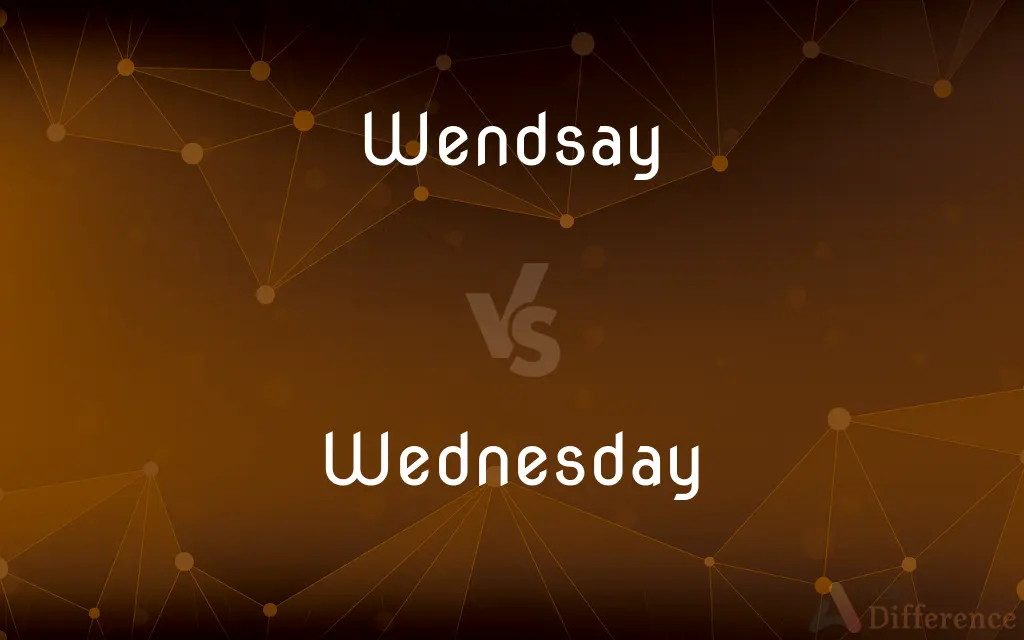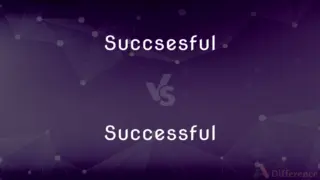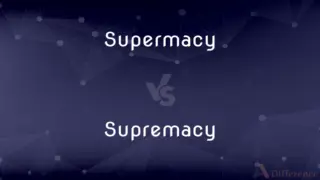Wendsay vs. Wednesday — Which is Correct Spelling?
Edited by Tayyaba Rehman — By Fiza Rafique — Updated on April 3, 2024
"Wendsay" is an incorrect spelling. The correct term is "Wednesday," which denotes the fourth day of the week following Tuesday.

Table of Contents
Which is correct: Wendsay or Wednesday
How to spell Wednesday?

Wendsay
Incorrect Spelling

Wednesday
Correct Spelling
ADVERTISEMENT
Key Differences
Keep in mind that weekdays generally don't end in "-say."
Remember it as "Wed-nes-day," focusing on three distinct syllables.
Visualize a calendar highlighting Wednesday.
Think of a wedding on a Wednesday for the "Wed" part.
Associate with the Norse god Odin as "Woden's Day."
ADVERTISEMENT
How Do You Spell Wednesday Correctly?
Incorrect: The office is closed every Wendsay.
Correct: The office is closed every Wednesday.
Incorrect: We're planning to leave on Wendsay morning.
Correct: We're planning to leave on Wednesday morning.
Incorrect: She thought the event was on Wendsay.
Correct: She thought the event was on Wednesday.
Incorrect: I have a meeting scheduled on Wendsay next week.
Correct: I have a meeting scheduled on Wednesday next week.
Incorrect: He has a dentist appointment on Wendsay.
Correct: He has a dentist appointment on Wednesday.
Wednesday Definitions
The fourth day of the week, after Tuesday.
I have a meeting scheduled for Wednesday.
Often used to describe regular events.
Every Wednesday, they offer a discount.
A midpoint of the typical working week.
By Wednesday, I usually need a break.
Symbolic of the middle of something.
It's the Wednesday of our project timeline.
Represents the day named after Woden or Odin.
Wednesday draws its name from ancient mythology.
The day of the week that comes after Tuesday and before Thursday.
The fourth day of the week; the next day after Tuesday.
The fourth day of the week; the third working day
Wednesday Meaning in a Sentence
She always visits her grandparents on Wednesday.
The new movie will premiere on Wednesday.
He started his new job on a Wednesday.
They're announcing the winners next Wednesday.
The library hosts storytime for kids every Wednesday.
Wednesday is the middle of the workweek for most people.
The workshop has been moved to Wednesday.
We have a standing meeting every Wednesday morning.
She usually works from home on Wednesdays.
The quiz is scheduled for Wednesday afternoon.
Every Wednesday, we have a team lunch at the office.
I'm planning to start my diet on Wednesday.
Our flight to Paris is scheduled for Wednesday.
The repair technician is coming on Wednesday.
Wednesday mornings are reserved for team meetings.
Wednesday night is trivia night at the local pub.
She always does her grocery shopping on Wednesday.
The museum is free on the first Wednesday of each month.
The project deadline was pushed to Wednesday.
I'll have the report ready by Wednesday.
He's giving a lecture next Wednesday.
They met on a rainy Wednesday.
The choir rehearses every Wednesday evening.
The farmers market is open on Wednesday.
They're holding auditions on Wednesday.
Common Curiosities
Why is it called Wednesday?
It's derived from "Woden's Day," named after the Norse god Odin or Woden.
What is the verb form of Wednesday?
"Wednesday" is a noun and does not have a verb form.
Which vowel is used before Wednesday?
The vowel "a" is used as in "on a Wednesday."
What is the pronunciation of Wednesday?
It's pronounced as /ˈwɛnzdeɪ/.
Which conjunction is used with Wednesday?
No specific conjunction is predominantly associated with "Wednesday."
What is the singular form of Wednesday?
"Wednesday" itself is singular.
What is the plural form of Wednesday?
The concept doesn't traditionally have a plural, but if referring to multiple instances, it could be "Wednesdays."
Is Wednesday an adverb?
No, "Wednesday" is not an adverb.
Is Wednesday a negative or positive word?
Neutral.
What is the root word of Wednesday?
The root is "Woden's Day," relating to the Norse god.
Is Wednesday a countable noun?
In specific contexts, e.g., "Three Wednesdays in a row."
Which preposition is used with Wednesday?
"On" is often used, as in "on Wednesday."
Is the Wednesday term a metaphor?
Not inherently, but can be used metaphorically in some contexts.
Is the word Wednesday a gerund?
No, it's not a gerund.
How many syllables are in Wednesday?
2 syllables.
How do we divide Wednesday into syllables?
Wednes-day.
Is Wednesday an abstract noun?
No, it refers to a specific day of the week.
Which article is used with Wednesday?
Both "a" and "the" can be used with "Wednesday."
Is Wednesday a collective noun?
No, it's not a collective noun.
What part of speech is Wednesday?
It is a noun.
What is the first form of Wednesday?
"Wednesday" as it's a noun.
Is Wednesday a noun or adjective?
"Wednesday" is primarily a noun.
Is the word Wednesday imperative?
No, "Wednesday" is a noun.
Which determiner is used with Wednesday?
Determiners like "this," "last," or "next" can be used, depending on context.
How is Wednesday used in a sentence?
"I always do my grocery shopping on Wednesday."
Is Wednesday a vowel or consonant?
"Wednesday" is a word and contains both vowels and consonants.
Is the word “Wednesday” a Direct object or an Indirect object?
"Wednesday" can be a direct object, e.g., "I love Wednesday."
What is a stressed syllable in Wednesday?
The first syllable, "Wed-," is stressed.
What is another term for Wednesday?
Midweek (though not an exact synonym).
What is the opposite of Wednesday?
There isn't a direct opposite, but you can contrast it with another day, e.g., "Sunday."
Share Your Discovery

Previous Comparison
Succsesful vs. Successful
Next Comparison
Supermacy vs. SupremacyAuthor Spotlight
Written by
Fiza RafiqueFiza Rafique is a skilled content writer at AskDifference.com, where she meticulously refines and enhances written pieces. Drawing from her vast editorial expertise, Fiza ensures clarity, accuracy, and precision in every article. Passionate about language, she continually seeks to elevate the quality of content for readers worldwide.
Edited by
Tayyaba RehmanTayyaba Rehman is a distinguished writer, currently serving as a primary contributor to askdifference.com. As a researcher in semantics and etymology, Tayyaba's passion for the complexity of languages and their distinctions has found a perfect home on the platform. Tayyaba delves into the intricacies of language, distinguishing between commonly confused words and phrases, thereby providing clarity for readers worldwide.


































